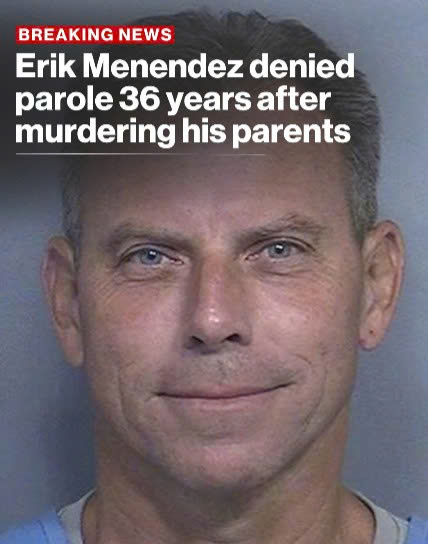Erik Menendez has been denied parole more than three decades after he and his brother Lyle were convicted of killing their parents, Jose and Kitty Menendez, in 1989, a case that captured national attention and continues to spark debate about justice, abuse, and accountability. At 54 years old, Erik appeared via video from the Richard J. Donovan Correctional Facility in San Diego for his first parole hearing, which lasted nearly ten hours.

The California parole board ultimately ruled that he would not be released, citing both his history and his behavior during incarceration, and declared he would not be eligible for another parole hearing for three more years. The board considered several factors in making its decision, including the burglaries Erik committed before the murders, the nature of his mother’s killing, and his actions while behind bars. Commissioner Robert Barton told him that killing his mother revealed “a lack of empathy and reason,” pointing out that Erik, then 18 years old, had other options, such as leaving home, contacting the police, or seeking refuge with relatives.
Barton acknowledged that victims of sexual assault often find it difficult to come forward, especially when the abuser is a family member, but stressed that this context did not excuse Erik’s actions. In his testimony, Erik said he shot his mother because she had “betrayed him,” explaining that after learning she allegedly knew of Jose Menendez’s abuse, he saw both parents as one. “I was in a state of terror, of panic, of rage,” he said, recalling the night of the crime. Despite these explanations, Barton emphasized that the denial of parole was based not solely on the seriousness of the crime but on Erik’s conduct in prison.
Barton said Erik had not been a model prisoner, contrary to what his supporters claimed. He cited instances of inappropriate behavior with visitors, smuggling contraband, misuse of state computers, incidents of violence, and possession of illegal cellphones. The board argued that these actions showed he continued to pose a risk to public safety, even while participating in rehabilitative programs. Barton urged Erik to reflect seriously on the hearing’s feedback, warning him against indulging in self-pity and reminding him that if he wanted a different outcome next time, he would need to show meaningful changes.
Erik’s family has long supported his release, and many testified on his behalf. His aunt, Terry Baralt, who is Jose Menendez’s sister and is currently battling colon cancer at age 85, spoke movingly about forgiveness. She said she had fully forgiven Erik, describing him as someone who carries himself with kindness and integrity, and expressed her hope to live long enough to welcome him into her home one day. After the hearing, Erik’s relatives released a statement expressing disappointment at the decision but reaffirming their belief in his growth and remorse. “Our belief in Erik remains unwavering, and we know he will take the Board’s recommendation in stride. His remorse, growth, and the positive impact he’s had on others speak for themselves,” they wrote.
Barton acknowledged being struck by the depth of support from Erik’s family but reminded everyone that two things could be true at once: they could forgive and love him, while he still could be considered unsuitable for parole. Meanwhile, attention now turns to Lyle Menendez, who is 57 and will have his parole hearing on Friday. Erik’s relatives said they were cautiously optimistic that Lyle would be judged differently, highlighting the work he has done to take responsibility and transform his life. Both brothers were initially sentenced to life without parole after their convictions, but recent changes in California law gave them another chance.
In May 2025, Judge Michael Jesic resentenced them to 50 years to life under youth offender parole statutes, making them immediately eligible for parole consideration because they were 18 and 21 at the time of the murders. Jesic said he was moved by letters of support from prison guards and impressed by the positive impact the brothers had on fellow inmates. During that resentencing hearing, both Erik and Lyle admitted their guilt, reflecting on the weight of their crimes and the years spent in prison.
Still, Los Angeles County District Attorney Nathan Hochman argued against parole for either brother, saying they had not shown full insight into their crimes or complete rehabilitation. A recent risk assessment classified them as moderate risks if released, noting that both had violated prison rules over the years, including possessing illegal cellphones, with Erik caught as recently as January of this year. Barton described the assessment as neutral but stressed that Erik’s behavior patterns remained concerning.
For now, Erik Menendez must wait three years before another parole hearing, unless he petitions the board to review its decision for errors. His only other avenue for earlier release would be executive clemency, which Governor Gavin Newsom has the power to grant at any time. As the legal process continues, the Menendez brothers remain figures at the intersection of crime, family tragedy, and ongoing debate about punishment, rehabilitation, and whether decades behind bars can ever undo the horror of their crimes.





